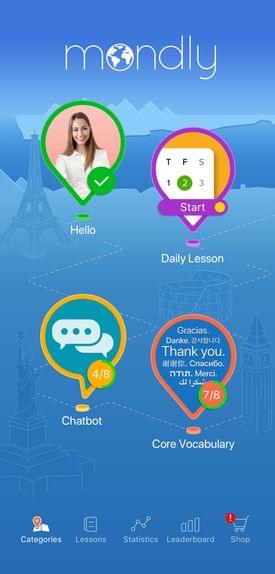How to speak Polish fluently in no time
Discover how to speak Polish with confidence
Traditional Polish language courses often begin with complex grammar rules and linguistic theories, which can feel overwhelming for beginners. At Mondly, we've transformed this approach. Our app, trusted by millions worldwide, focuses on getting you to speak Polish from day one. With Mondly, you're not just learning rules — you're speaking Polish from day one, building real-world skills with every lesson.
● Practical Conversations from Day One: Instead of burdening you with abstract concepts, we immerse you in practical Polish conversations right from the start. Within just 5 minutes of using Mondly, you'll be engaging in your first Polish dialogue. Isn't this a more exciting way to kick off your language learning journey?
● Authentic Listening Experiences: Our language experts have uncovered a key to mastering Polish — authentic listening. The human brain is naturally wired to absorb language through hearing, so we've made native Polish audio a central feature of our lessons.
● Learn Real Pronunciation: Throughout your learning journey, you'll hear Polish spoken naturally and in context by native speakers. This method helps you effortlessly pick up the nuances of Polish pronunciation, from the unique "sz" and "cz" sounds to the intricate vowel distinctions.
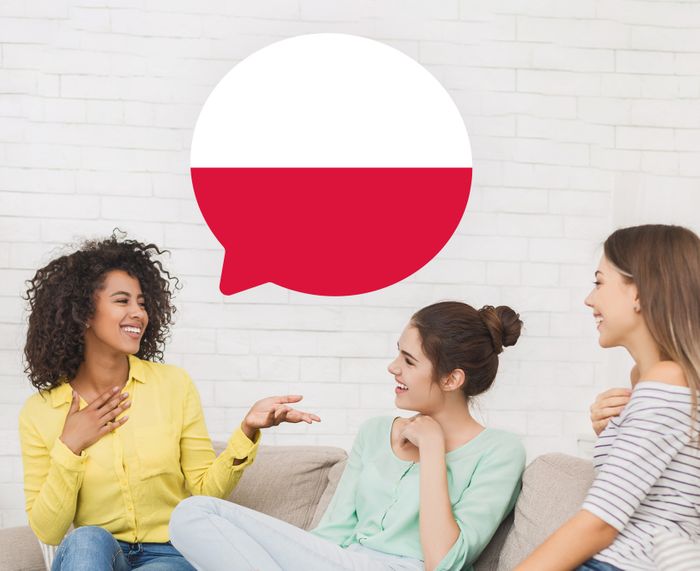
Speak Polish from day one
1. Cześć. = Hello.
First impressions matter—don’t let anyone tell you otherwise. Even learning a simple "hello" in Polish can transform your interactions with locals. In Polish, "hello" is "cześć" (pronounced chesht). Listen to how it’s pronounced and take the first step toward mastering how to speak Polish!
Cześć.
2. Jak się masz? = How are you?
What’s a polite follow-up to a great introduction? Asking, "How are you?" In Polish, you can skip a formal hello and dive straight into this thoughtful question. Here’s how to say "Jak się masz?" (pronounced yahk sheh mahsh)—an essential phrase for anyone wanting to learn Polish words for daily conversation.
Jak się masz?
3. Jak masz na imię? = What is your name?
When traveling in Poland, you'll likely meet new people—from a friendly seatmate on the train to your host or taxi driver. To ask someone their name, you can use these Polish phrases: "Jak masz na imię?" (informal, pronounced yahk mahsh nah ee-myeh) or "Jak ma Pan/Pani na imię?" (formal, pronounced yahk mah pahn/pah-nee nah ee-myeh). Practice these phrases and master speaking Polish in everyday situations.
Jak masz na imię?
4. Miło mi cię poznać. = Nice to meet you.
Locals often appreciate it when you make an effort to speak their language—it shows respect and curiosity about their culture. When meeting new people in Poland, knowing how to say "Nice to meet you" can leave a lasting impression. In Polish, the phrase is "Miło mi cię poznać" (pronounced mee-woh mee cheh poz-nach). Click to hear the correct pronunciation and make every introduction memorable.
Miło mi cię poznać.
5. Proszę. = Please.
Manners are a cornerstone of every culture, and Poland is no exception. In Polish society, politeness and respect are highly valued, especially in language. Using the right expressions at the right time can greatly impact your interactions. To say "please" in Polish, use the word "proszę" (pronounced proh-sheh). Whether you’re asking for something or adding a touch of courtesy, this word is essential for anyone learning to speak Polish.
Proszę.
6. Dziękuję. = Thank you.
Mothers are the best thing that ever happened to us. They not only raised us but also instilled essential manners like saying "thank you" in the right context. If you’re following their example and want to express gratitude in Polish, say "dziękuję" (pronounced jen-koo-yeh). It’s a simple phrase that speaks volumes about kindness and respect when learning Polish words for everyday life.
Dziękuję.
7. Nie ma za co. = You're welcome.
Courtesy knows no boundaries, and Poland is no exception. In Polish culture, polite responses are just as valued as the initial interaction. To say "you’re welcome," use "proszę bardzo" (pronounced proh-sheh bar-dzo). Mastering these phrases is key to learning how to speak Polish fluently and respectfully.
Nie ma za co.
8. Przepraszam! = Excuse me!
We only need 7 seconds to make an impression that may last a lifetime. And sometimes, the difference between a good impression and a bad one is as simple as saying "excuse me." In Polish, this phrase is "przepraszam" (pronounced psheh-prah-shahm). Listen and learn how to pronounce it correctly—it’s a vital step when you’re learning how to speak Polish!
Przepraszam!
9. Ile to kosztuje? = How much does it cost?
Shopping sprees are a must for every city break, especially when it comes to buying souvenirs for loved ones. If you're in Poland, knowing how to ask "How much does it cost?" in Polish is invaluable. The phrase is "Ile to kosztuje?" (pronounced ee-leh toh koh-sh-too-yeh). Listen and learn to make your shopping experience more authentic while practicing how to speak Polish!
Ile to kosztuje?
10. Do widzenia. = Goodbye.
To leave a lasting impression after a flawless Polish greeting, end the conversation like a pro by saying "goodbye" just as a native speaker would. In Polish, say "do widzenia" (pronounced doh veed-zen-yah). Here’s exactly how to say it confidently.
Do widzenia.
Join millions of people learning how to speak Polish!
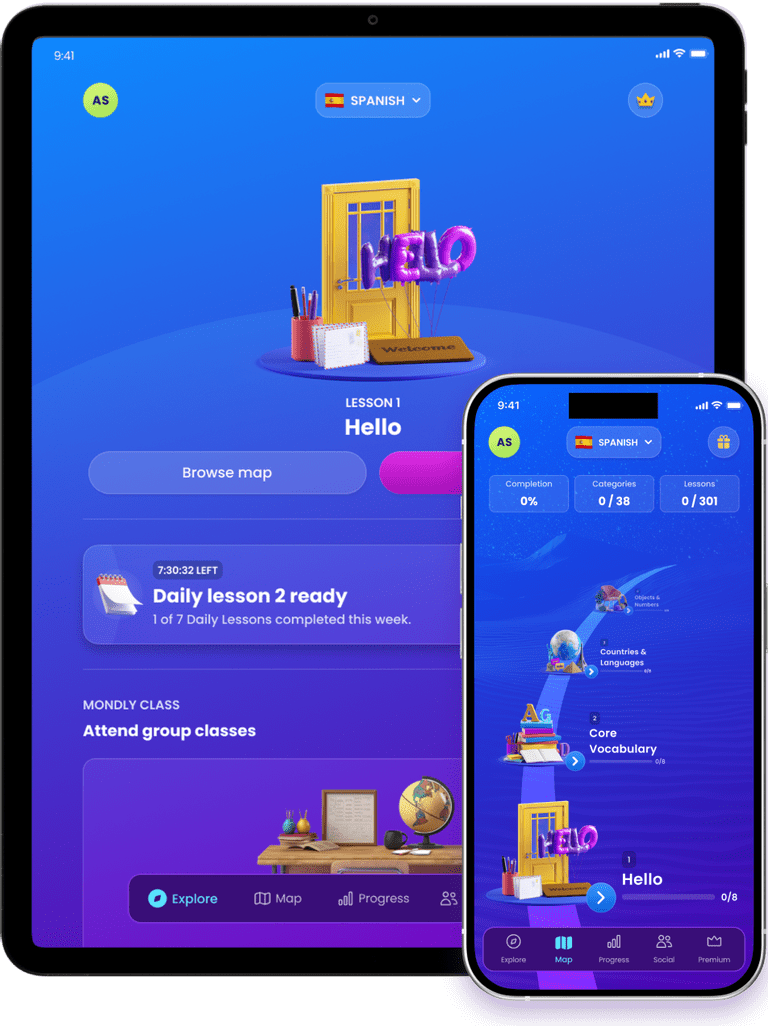
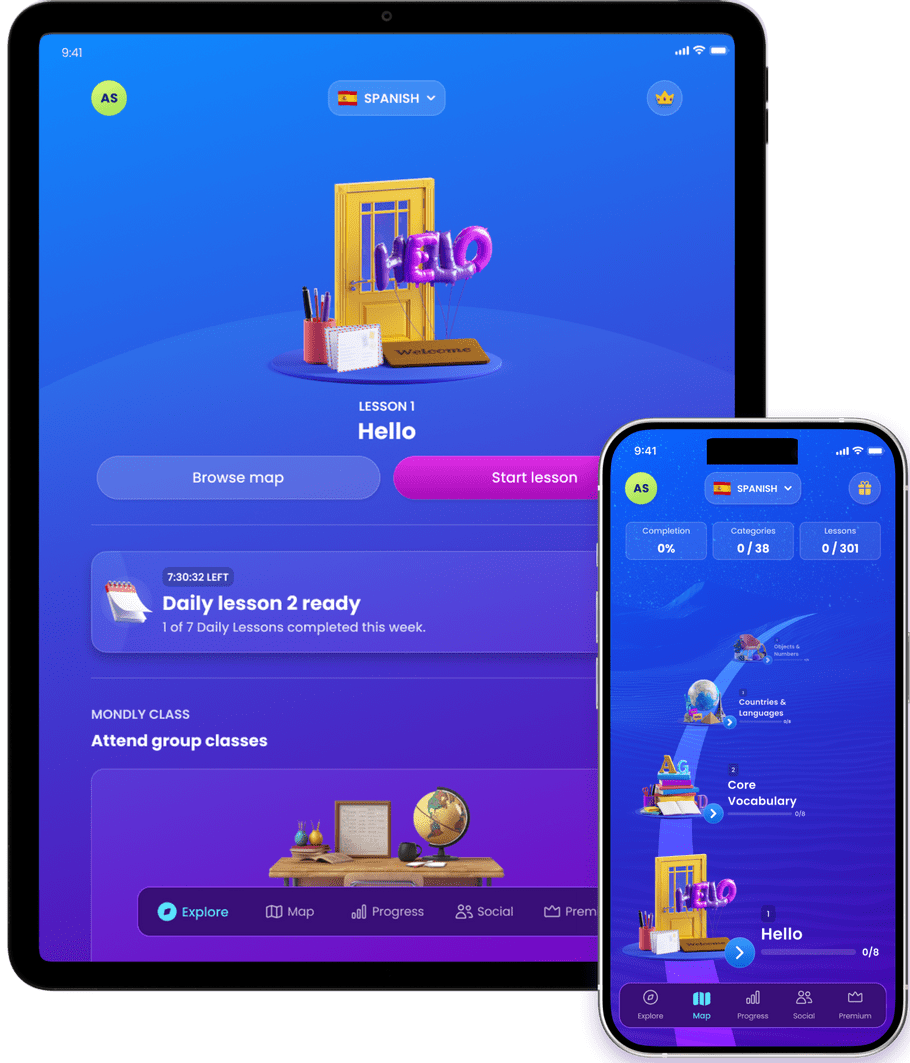
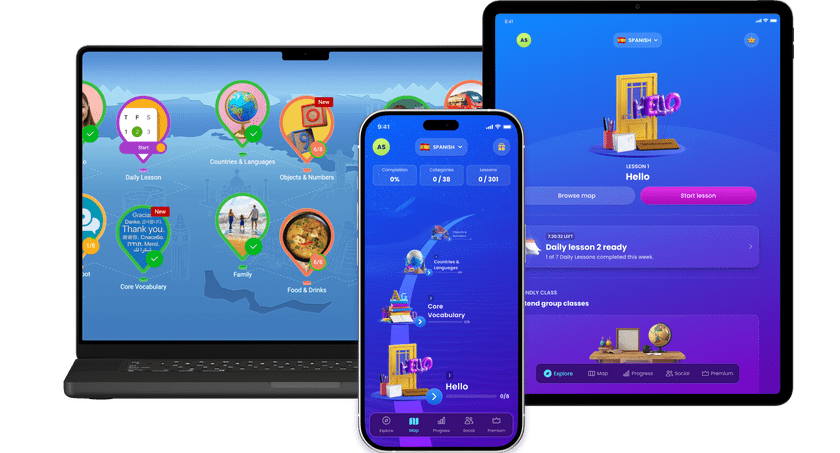

1 000 000+ + Ratings
Mondly was named "Editors' Choice" in Google Play and "Best New App" by Apple.
Polish conversations for perfect pronunciations
There’s no need to search for Polish conversation partners or plan a trip to Warsaw. We’ve developed a revolutionary solution: the Mondly Chatbot. This advanced AI engages you in natural Polish conversations, understanding your responses and replying just like a real Polish speaker would. It’s an immersive, judgment-free way to practice speaking Polish anytime, anywhere. It’s no surprise that millions worldwide rely on this feature to enhance their Polish speaking abilities.
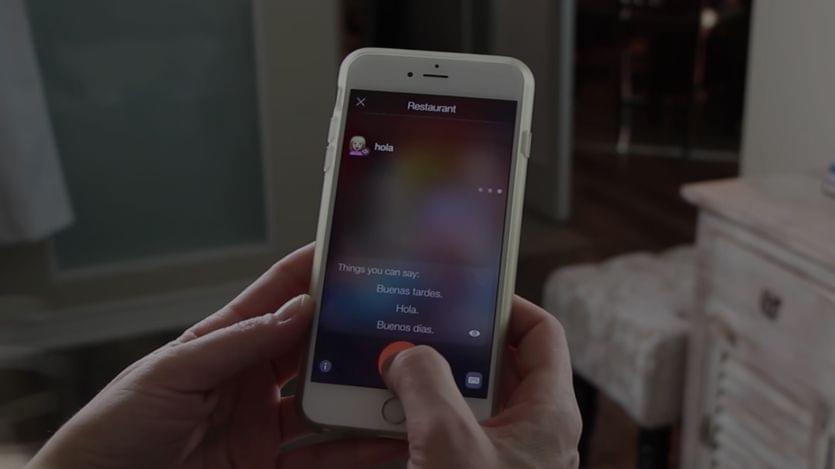

Learn to speak Polish in Virtual Reality
Introducing Mondly VR, a groundbreaking virtual reality application designed to help you speak Polish fluently. Put on your VR headset and find yourself immersed in a Polish-speaking world. Order traditional pierogi at a cozy Warsaw café, engage in lively conversations on a train to Kraków, or check into a charming hotel in Gdańsk. This immersive experience is the closest you can get to real-life language immersion, making it an incredibly effective way to learn how to speak Polish confidently and naturally.
Remember that moment of panic when someone addresses you in Polish, and you scramble to respond?
With Mondly VR, you can practice these scenarios comfortably from home. Rehearse Polish conversations as many times as needed in a pressure-free environment, receiving instant feedback to refine your skills. This method builds the confidence you need to use Polish words and phrases in real-world situations. Mondly’s ultimate goal is to teach you how to speak Polish fluently, enabling genuine conversations with native speakers. Mondly VR accelerates your learning journey, making the path to Polish fluency both enjoyable and highly effective.


Did you know this about Polish?
In the world of languages, Polish stands out with its regional dialects and rich linguistic history, offering learners a unique glimpse into Poland's cultural and regional diversity. While Standard Polish (język ogólnopolski) is widely taught and understood, exploring the language’s regional variations adds depth and cultural insight for learners and linguists alike. Polish dialects, known as "dialekty" or "gwary", vary across regions in pronunciation, vocabulary, and even grammar. The major varieties include: Despite these regional variations, Standard Polish serves as the lingua franca among Polish speakers, ensuring mutual understanding across different regions and among global Polish communities.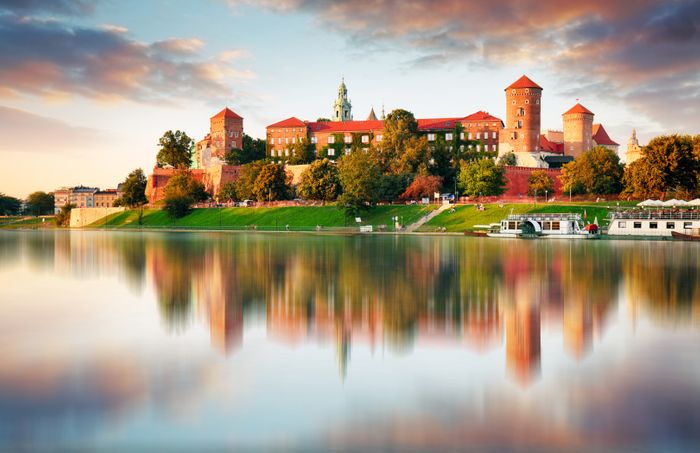
Learning Polish could be an excellent choice. Poland’s growing economy, rich cultural heritage, and rising prominence in international business make Polish an increasingly valuable language globally. By mastering Polish words and fluency, you unlock opportunities in various fields such as international trade, diplomacy, art and design, and emerging technologies—areas where Poland excels. Moreover, Polish serves as a gateway to understanding other Slavic languages, further expanding your linguistic and cultural horizons.
● Standard Polish: The official form of Polish, used in education, media, and formal communication. It’s the most widely understood and neutral variety across Poland.
● Greater Polish (Wielkopolski): Spoken in the western part of Poland, this dialect features distinct vocabulary and pronunciations.
● Lesser Polish (Małopolski): Predominantly spoken in southern Poland, including Kraków, this dialect includes unique vowel shifts and local expressions.
● Masovian (Mazowiecki): Used in the central regions, including Warsaw, it forms the basis of Standard Polish with subtle regional differences.
● Silesian (Śląski): Spoken in Silesia, this dialect has Germanic influences and is sometimes considered a separate language.
● Kashubian (Kaszubski): Technically a separate language, Kashubian is spoken in northern Poland and retains features distinct from Standard Polish.

Speaking Polish has major benefits for you

Speak with over 50 million Polish speakers worldwide
Learning conversational Polish is an incredibly rewarding skill. It enables you to communicate effectively when visiting Poland and engaging with Polish-speaking communities around the globe. This ability enhances your travel experiences, opens up opportunities for cultural exchanges, and allows you to gain a deeper understanding and appreciation of Polish culture, history, and society. Mastering Polish words and phrases brings you closer to the heart of Poland and its people.

Transform your travels to Poland with the power of Polish
Wherever your travels take you, speaking Polish will elevate your experiences, especially when exploring Poland. From Warsaw and Kraków to Gdańsk or Zakopane, knowing Polish helps you immerse yourself in the culture like a local. You'll gain a more authentic and enriching experience by engaging with the local people, traditions, and customs. Understanding Polish not only bridges communication gaps but also makes your journey truly unforgettable.

Speaking Polish can boost your career
Being able to speak Polish significantly increases your employability and sets you apart in the job market. Polish language skills open doors to better job opportunities, promotions, and competitive positions in Poland and Polish-speaking communities. Poland is home to a growing number of international companies, making Polish an invaluable asset for anyone looking to succeed in the global job market. Start mastering Polish words today to unlock these professional advantages.

Speaking Polish enhances your cognitive abilities
Research shows that learning multiple languages, including Polish, can increase grey matter in your brain, improving cognitive functions such as memory and problem-solving skills. Adding Polish to your language repertoire not only connects you to a vibrant culture but also gives your brain a boost. Start learning Polish today and experience the cognitive benefits that come with mastering a new language.
Join 125 million people learning a language with Mondly by Pearson
Learn Polish for free with Mondly
Related Pages
Learn Polish OnlinePolish WordsPolish Phrases and ExpressionsPolish GrammarPolish LessonsSubscribe to our newsletter
Join over 125 million people enjoying our occasional language tips, special offers and more.
The email address is not valid
Subscribe









